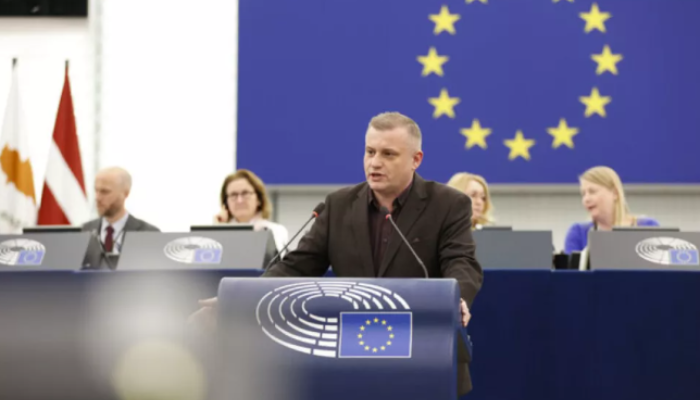Three Polish Members of the European Parliament (MEPs) from the far-right Confederation party—Marcin Sypniewski, Stanisław Tyszka, and Ewa Zajączkowska-Hernik—are reportedly dissatisfied with the Europe of Sovereign Nations (ESN) group’s position on Russia and its controversial political affiliations. These tensions have raised questions about the future of their relationship with the ESN group, though, for now, they have not announced their departure.
Key Issues for Polish MEPs in the ESN Group
The primary source of dissatisfaction for the Polish MEPs is the ESN’s approach to Russia. Tensions escalated after Bulgarian party Revival’s participation in the May 9 Victory Day parade in Moscow. Revival, which signed a cooperation agreement with Russia’s United Russia party, sparked unease among the Polish MEPs. This is further compounded by an ongoing investigation into whether Revival’s MEPs received financial support from United Russia.
For Poland, which has a long history of caution towards Russia, the situation is a sensitive matter. The Polish MEPs are reportedly uncomfortable with the ESN’s pro-Russian leanings and the perceived indifference to Russian aggression, which contrasts with Poland’s strong stance on safeguarding European sovereignty.
Concerns Over ESN’s Ties with German Far-Right AfD Party
Another key point of contention for the Polish delegation is the ESN’s alliance with Germany’s far-right party, Alternative for Germany (AfD). AfD’s members have been accused of sympathizing with Russian interests, further complicating the political dynamic for Poland’s MEPs. One of the AfD MEPs, Peter Bystron, is under investigation for allegedly accepting bribes to support Russian policies, heightening concerns about the group’s integrity.
In Poland, the alliance with AfD is especially problematic due to strong nationalist sentiment and anti-German feelings. The Confederation party’s affiliation with AfD has led to growing criticism both within the ESN and from Polish right-wing voters.
Risks of Leaving the ESN Group
While tensions are mounting, the three Polish MEPs have not yet made a move to leave the ESN group. Leaving would mean losing critical privileges such as speaking time during plenary sessions and staff funding, which are allocated to group members. Given these challenges, the Polish MEPs are weighing their options carefully.
A potential alternative is the Patriots for Europe (PfE) group, which includes other Confederation MEPs like Anna Bryłka and Tomasz Buczek. Sources suggest that the Polish MEPs might be more easily accepted into the PfE group compared to the larger AfD delegation. However, the PfE has not made any official comment regarding ongoing talks with the Polish delegation.
The Impact of a Potential Split
The situation in the ESN group is precarious. The group currently has 27 MEPs from eight member states, but internal divisions could destabilize the group if the Polish delegation were to depart. European Parliament rules require political groups to have at least 23 MEPs from a minimum of seven member states to maintain official status. Without Poland’s MEPs, ESN might fall below this threshold, which could have significant consequences.
Leadership Challenges for Stanisław Tyszka
Stanisław Tyszka, one of the three Polish MEPs, faces a particularly delicate situation. As co-chairman of the ESN group, Tyszka has been reluctant to relinquish his leadership role, despite growing tensions. His position in the group is crucial for maintaining the ESN’s current political strength, and his potential departure could deal a blow to the group’s stability.
Navigating the Future of the Polish MEPs
The Polish MEPs must now decide whether to accept the ESN’s positions on Russia and its affiliations or to risk the disadvantages of leaving the group. If they choose to stay, they must navigate the ongoing disagreements and weigh the benefits of continued membership. A decision is expected soon, but for now, the Polish delegation remains committed to the group.
Conclusion: The Bigger Picture in European Politics
This evolving situation in the European Parliament illustrates the complexity of far-right politics in Europe. As the Polish MEPs wrestle with their position in the ESN, their decision could have broader implications for European politics, particularly with regard to Russia and the shifting alliances among nationalist parties.
While tensions within the ESN group remain high, the Polish MEPs are unlikely to make any immediate moves. The internal dynamics within the far-right coalition, including the influence of Russia and the German AfD party, will continue to shape the future of the ESN group in the European Parliament.

